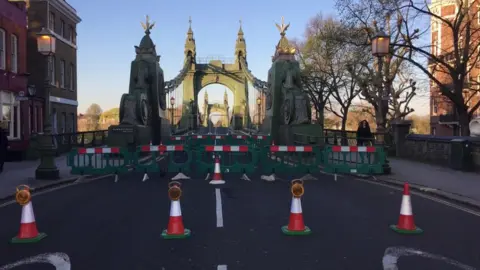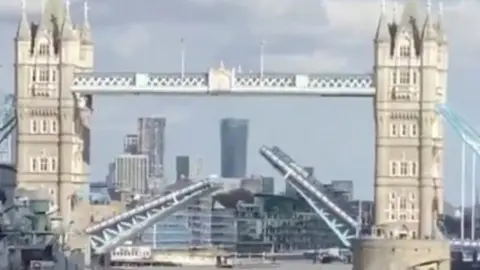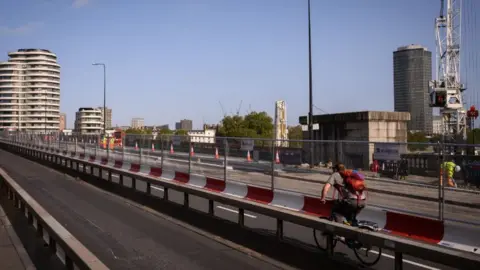London's bridges 'are the capital's embarrassment'
Cities are in part defined by their bridges and crossings. They are meant to be the jewels along their rivers, provide vital transport links and beautiful vantage points of a city.
In London though, some are in a poor state and are an embarrassment.
Hammersmith Bridge is Grade II listed but it was so hammered by heavy traffic it is now shut - even rowing boats cannot pass underneath.
It is made of cast iron meaning tiny cracks have appeared and they could cause the whole structure to shatter.
Repairing the bridge is estimated to cost £141m and its owner, Hammersmith and Fulham Council, says it can't afford it.
It is easy to see why as the council's total annual budget for the whole of 2020/21 is £140.20m.
Extra costs are mounting up on Hammersmith Bridge.

River traffic can't go under the bridge and I'm told 'guard boats' cost £120 an hour. It costs £2.7m a year to monitor the bridge sitting there doing nothing.
Its closure has meant a huge inconvenience for many who live in Hammersmith and Barnes and for many businesses.
The London School of Economic's (LSE) Professor Tony Travers said this bridge has been failed by the political structures and systems that are meant to maintain it.
"It's true there are structural problems with the bridge but there are structural problems clearly with government as well," Prof Travers said.
"So the borough who owns it can't afford to repair it, neither can Richmond on the other side.
"The question is: is the government going to find a way of allowing the money to be patched up to make use temporarily? Or are we just going to go on with this struggle of different levels of government saying its the others' fault, in the months to come?"
 London Borough of Hammersmith and Fulham
London Borough of Hammersmith and FulhamThe government, Transport for London (TfL) and the councils are now trying to work out how to re-open the bridge but it's not clear when that will happen.
And London's other bridges are not all in a good way.
Elsewhere TfL owns seven bridges, all of them show varying signs of deterioration.
Documents show Chiswick and Westminster bridges are defined as being in a "good" condition but that still means there are early signs of deterioration and some minor treatments "may be merited".
Four bridges - Twickenham, Kew, Battersea and Lambeth - are classed as "fair". That means "more extensive interventions may be required within 10 years."
Vauxhall Bridge is rated as "poor". It is already getting extensive renovations and the Rotherhithe Tunnel will need repairing at an estimated cost of between £116m and £178m.
 Huw Evans picture agency
Huw Evans picture agencyExperts say we should get used to closures as bridges are facing a perfect storm of heavy traffic flows and extreme weather from climate change.
Nottingham University's Dr Luke Prendergast said: "We have more traffic on our roads than ever before. So we have got a lot more loading on our structures than they're designed to withstand.
"It is quite likely that we will see a lot more bridge closures for routine maintenance."
The other issue is there isn't one over-arching strategic body in charge of London's bridges.
 Getty Images
Getty ImagesSeven bridges are owned by TfL and five of London's bridges into the City are maintained by the Bridge House Estate. This was formed by the City in 1282 and initially raised its funds through tolls.
A TfL spokeswoman said: "All bridges maintained by TfL are safe and have regular structural inspections to ensure that they can remain open to traffic, with maintenance carried out to keep them in good working order.
"This includes day-to-day maintenance, as well as larger scale works, which typically take place every 20 to 30 years."
Elsewhere, London councils own the bridges meaning closures are sometimes not co-ordinated and long-term funding is not set aside.
"Vauxhall Bridge has been closed," Prof Travers said. "London Bridge has been closed, there was the incident when one of the bascules on Tower Bridge got stuck open.
"You can sort of see Hammersmith Bridge as a metaphor for Britain in its current predicament.
"Now, I don't think the UK Government sees it like that but it's easy for those outside the UK to see it as a metaphor for troubles in UK Government as we speak."
Twenty years ago a letter to the Evening Standard stated that London's bridges ought to be London's treasure and are now London's disgrace.
There were calls in Parliament for a "strong, co-ordinated body responsible for the planning and financing" of all London's bridges.
But not much has happened since then.
